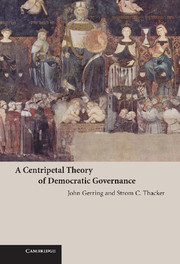Crossref Citations
This Book has been
cited by the following publications. This list is generated based on data provided by Crossref.
Gerring, John
Thacker, Strom C.
and
Moreno, Carola
2009.
Are Parliamentary Systems Better?.
Comparative Political Studies,
Vol. 42,
Issue. 3,
p.
327.
HELLWIG, TIMOTHY
MIKULSKA, ANNA
and
GEZGOR, BURCU
2010.
Perceptions of policy choice in contemporary democracies.
European Journal of Political Research,
Vol. 49,
Issue. 6,
p.
705.
Ganghof, Steffen
2010.
Resiliente Demokratietypen. Eine vergleichende Analyse.
Zeitschrift für Vergleichende Politikwissenschaft,
Vol. 4,
Issue. 1,
p.
5.
Fenna, Alan
2011.
Form and Function in Federal Systems.
Australian Journal of Political Science,
Vol. 46,
Issue. 1,
p.
167.
Phelan, William
2011.
Open international markets without exclusion: encompassing domestic political institutions, international organization, and self-contained regimes.
International Theory,
Vol. 3,
Issue. 2,
p.
286.
Greer, Scott L.
2012.
The European Centre for Disease Prevention and Control: Hub or Hollow Core?.
Journal of Health Politics, Policy and Law,
Vol. 37,
Issue. 6,
p.
1001.
Yadav, Vineeta
2012.
Legislative Institutions and Corruption in Developing Country Democracies.
Comparative Political Studies,
Vol. 45,
Issue. 8,
p.
1027.
Williams, Brian D.
2012.
Institutional Change and Legislative Vote Consensus in New Zealand.
Legislative Studies Quarterly,
Vol. 37,
Issue. 4,
p.
559.
Ganghof, Steffen
2012.
Resilient patterns of democracy. A comparative analysis.
Zeitschrift für Vergleichende Politikwissenschaft,
Vol. 6,
Issue. S2,
p.
103.
Cuono, Massimo
2013.
La bureaucratisation néolibérale.
p.
177.
de Soysa, Indra
and
Vadlammanati, Krishna Chaitanya
2013.
Do pro-market economic reforms drive human rights violations? An empirical assessment, 1981–2006.
Public Choice,
Vol. 155,
Issue. 1-2,
p.
163.
Joshi, Devin K.
2013.
The protective and developmental varieties of liberal democracy: a difference in kind or degree?.
Democratization,
Vol. 20,
Issue. 2,
p.
187.
Kasuya, Yuko
2013.
Presidents, Assemblies and Policy-making in Asia.
p.
1.
Monsiváis Carrillo, Alejandro
2013.
Para repensar la profundización democrática: ideales, conceptos y desafíos analíticos.
Estudios Fronterizos,
Vol. 14,
Issue. 28,
p.
131.
Ibarra Salazar, Jorge
and
García Pérez, Francisco
2013.
Elasticidades de sustitución y separabilidad de los factores productivos de la industria.
Estudios Fronterizos,
Vol. 14,
Issue. 28,
p.
155.
Trosky, Abram
and
Campbell, Tristyn
2013.
International Handbook of Peace and Reconciliation.
p.
631.
Doorenspleet, Renske
and
Pellikaan, Huib
2013.
Which type of democracy performs best?.
Acta Politica,
Vol. 48,
Issue. 3,
p.
237.
Joshi, Devin
and
Rosenfield, Erica
2013.
MP Transparency, Communication Links and Social Media: A Comparative Assessment of 184 Parliamentary Websites.
The Journal of Legislative Studies,
Vol. 19,
Issue. 4,
p.
526.
Manna, Paul
2013.
Centralized Governance and Student Outcomes: Excellence, Equity, and Academic Achievement in the U.S. States.
Policy Studies Journal,
Vol. 41,
Issue. 4,
p.
682.
Croissant, Aurel
and
Wurster, Stefan
2013.
Performance and persistence of autocracies in comparison: introducing issues and perspectives.
Contemporary Politics,
Vol. 19,
Issue. 1,
p.
1.





